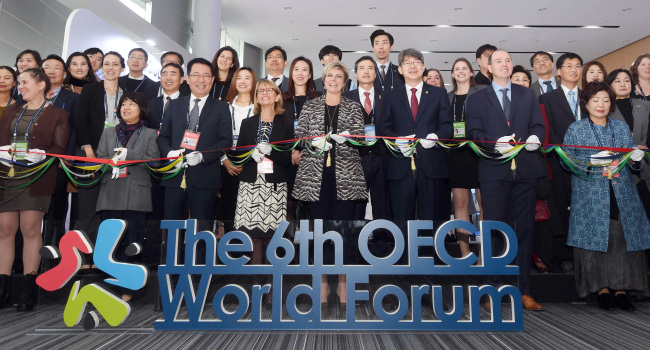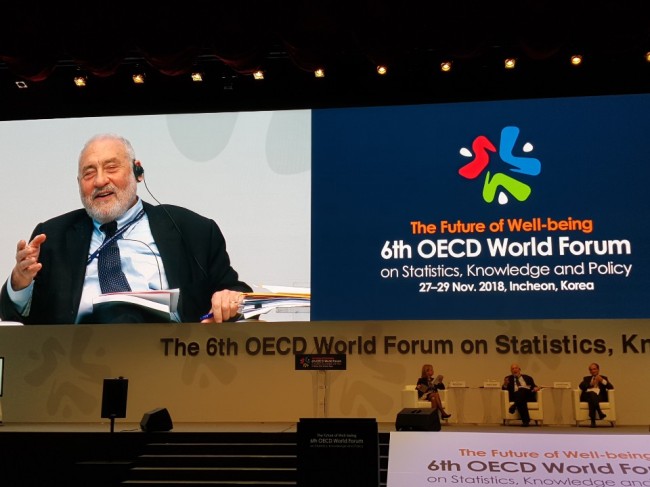Economic measurements should move ‘beyond GDP’: experts
Speakers at 6th OECD World Forum call for alternative measurements of economic well-being
By Bae HyunjungPublished : Nov. 27, 2018 - 17:06
The excessive focus on gross domestic product has often misguided economic policies and has to some extent contributed to major global challenges including the 2008 global financial crisis, according to key speakers participating in the Organization for Economic Cooperation and Development’s sixth World Forum held here Tuesday.
In the case of South Korea, policymakers need to address agenda related to subjective well-being, such as long working hours, they said.
In the case of South Korea, policymakers need to address agenda related to subjective well-being, such as long working hours, they said.

The OECD and Statistics Korea jointly kicked off the sixth OECD World Forum at Songdo Convensia in Incheon, under the title “The Future of Well-being.”
The opening of the three-day event was attended by OECD Secretary-General Angel Gurria, South Korea’s Deputy Prime Minister and Finance Minister Kim Dong-yeon, and Statistics Korea Commissioner Kang Shin-wook, along with senior OECD officials and policymakers from around the globe. Speaking for academia were renowned professors in economics, including Nobel Prize winner Joseph Stiglitz, Jean-Paul Fitoussi and Jeffery Sachs.
“Facing the changes in international cooperation these days, such as digitalization, climate change, (and) proliferation of fake news, we need to keep our statistical tools up and ready and to push indicators in order to improve real people’s lives,” said the OECD chief official in his keynote speech.
South Korean President Moon Jae-in, through a video address, underlined the Korean government’s economic vision for an inclusive state, aligning the country’s values with those of the OECD.
“Employment and income distribution statistics have been making headlines here, indicating that citizens today are growing more interested in the quality of life and well-being than (conventionally valued) macroeconomic indexes,” Minister Kim also said in his welcoming speech, backing the president’s stance.
Asia’s fourth-largest economy, which grew 3.1 percent in 2017, saw its exports accumulate at $503.5 billion as of end-October this year, a record pace of expansion.
During the same period, however, the total number of newly employed people remained under the 100,000 mark, down some 70 percent from a year earlier. The gap between the top 20 percent of households by income and the bottom 20 percent widened further as of the end of the third quarter, according to data from Statistics Korea.
The main agenda item of the first day of the forum was the presentation of the OECD’s second High-Level Expert Group report, following the first edition unveiled in 2009 in the aftermath of the global financial crisis.
The report was authored by senior OECD officials and renowned economic scholars, including Secretary-General Gurria and Chief Statistician Martine Durand, as well as Stiglitz and Fitoussi, two of the co-authors of economic best-seller “Mismeasuring Our Lives: Why GDP Doesn’t Add Up.”
Titled “Beyond GDP,” the latest report calls for more comprehensive well-being measurements that cover the social and economic changes of the modern world, pointing out that the previous “myth” about GDP has misguided policymakers and possibly contributed to past financial crises.
The opening of the three-day event was attended by OECD Secretary-General Angel Gurria, South Korea’s Deputy Prime Minister and Finance Minister Kim Dong-yeon, and Statistics Korea Commissioner Kang Shin-wook, along with senior OECD officials and policymakers from around the globe. Speaking for academia were renowned professors in economics, including Nobel Prize winner Joseph Stiglitz, Jean-Paul Fitoussi and Jeffery Sachs.
“Facing the changes in international cooperation these days, such as digitalization, climate change, (and) proliferation of fake news, we need to keep our statistical tools up and ready and to push indicators in order to improve real people’s lives,” said the OECD chief official in his keynote speech.
South Korean President Moon Jae-in, through a video address, underlined the Korean government’s economic vision for an inclusive state, aligning the country’s values with those of the OECD.
“Employment and income distribution statistics have been making headlines here, indicating that citizens today are growing more interested in the quality of life and well-being than (conventionally valued) macroeconomic indexes,” Minister Kim also said in his welcoming speech, backing the president’s stance.
Asia’s fourth-largest economy, which grew 3.1 percent in 2017, saw its exports accumulate at $503.5 billion as of end-October this year, a record pace of expansion.
During the same period, however, the total number of newly employed people remained under the 100,000 mark, down some 70 percent from a year earlier. The gap between the top 20 percent of households by income and the bottom 20 percent widened further as of the end of the third quarter, according to data from Statistics Korea.
The main agenda item of the first day of the forum was the presentation of the OECD’s second High-Level Expert Group report, following the first edition unveiled in 2009 in the aftermath of the global financial crisis.
The report was authored by senior OECD officials and renowned economic scholars, including Secretary-General Gurria and Chief Statistician Martine Durand, as well as Stiglitz and Fitoussi, two of the co-authors of economic best-seller “Mismeasuring Our Lives: Why GDP Doesn’t Add Up.”
Titled “Beyond GDP,” the latest report calls for more comprehensive well-being measurements that cover the social and economic changes of the modern world, pointing out that the previous “myth” about GDP has misguided policymakers and possibly contributed to past financial crises.

“The report seeks to set up measurements for things such as insecurity, inequality, and trust,” said Stiglitz.
“We hope that our work may function as an index for policymakers, people, governments and the world in general.”
The Korean economy, while keeping up a reasonable pace of growth, has some improvements to make in the subjective well-being sector, experts also pointed out.
“South Korea displays one of the lowest levels of subjective well-being (among OECD states), its trust in institutions standing particularly low,” said statistics chief Durand.
“Due to the long working hours, people spend little time with their family and women are pushed out of the labor market, while children are weighed down by a highly competitive education system.”
In light of such poor work-life balance, the South Korean economy is in need of policy actions such as a cap in working hours, according to the official.
“Statistics are the most objective and scientific set of tools to analyze social phenomena and to respond to them,” said Statistics Korea chief Kang.
“Over the past five forums, the OECD has successfully proven that the promotion of people’s well-being and happiness is built upon the measurement of well-being indexes.”
During sessions, panelists urged the Korean government to explore ways to enhance two-way communication with citizens in an effort to restore public trust toward government institutions.
The government should address citizens’ discontent to resolve the “expectations gaps” and concerns related to fairness, said Stephane Jacobzone, acting head of reform of the public sector division at the OECD public governance directorate, based on joint research undertaken by the Korea Development Institute and the OECD.
The research, based on surveys conducted in 2016, indicated that interactions with civil servants have the highest positive effect on institutional trust. It also showed that Koreans expressed high levels of trust in public services, the school system and civic organizations, while showing low levels of trust toward the National Assembly and local councils.
The research is in line with the Moon Jae-in administration’s effort to improve trust in the government, said Lim Won-hyuk, associate dean of the KDI school of public policy management, adding Korea’s trust in the government has been below the OECD average.
By Bae Hyun-jung and Son Ji-hyoung
(tellme@heraldcorp.com), (consnow@heraldcorp.com)
“We hope that our work may function as an index for policymakers, people, governments and the world in general.”
The Korean economy, while keeping up a reasonable pace of growth, has some improvements to make in the subjective well-being sector, experts also pointed out.
“South Korea displays one of the lowest levels of subjective well-being (among OECD states), its trust in institutions standing particularly low,” said statistics chief Durand.
“Due to the long working hours, people spend little time with their family and women are pushed out of the labor market, while children are weighed down by a highly competitive education system.”
In light of such poor work-life balance, the South Korean economy is in need of policy actions such as a cap in working hours, according to the official.
“Statistics are the most objective and scientific set of tools to analyze social phenomena and to respond to them,” said Statistics Korea chief Kang.
“Over the past five forums, the OECD has successfully proven that the promotion of people’s well-being and happiness is built upon the measurement of well-being indexes.”
During sessions, panelists urged the Korean government to explore ways to enhance two-way communication with citizens in an effort to restore public trust toward government institutions.
The government should address citizens’ discontent to resolve the “expectations gaps” and concerns related to fairness, said Stephane Jacobzone, acting head of reform of the public sector division at the OECD public governance directorate, based on joint research undertaken by the Korea Development Institute and the OECD.
The research, based on surveys conducted in 2016, indicated that interactions with civil servants have the highest positive effect on institutional trust. It also showed that Koreans expressed high levels of trust in public services, the school system and civic organizations, while showing low levels of trust toward the National Assembly and local councils.
The research is in line with the Moon Jae-in administration’s effort to improve trust in the government, said Lim Won-hyuk, associate dean of the KDI school of public policy management, adding Korea’s trust in the government has been below the OECD average.
By Bae Hyun-jung and Son Ji-hyoung
(tellme@heraldcorp.com), (consnow@heraldcorp.com)


















![[Today’s K-pop] BTS pop-up event to come to Seoul](http://res.heraldm.com/phpwas/restmb_idxmake.php?idx=642&simg=/content/image/2024/04/17/20240417050734_0.jpg&u=)